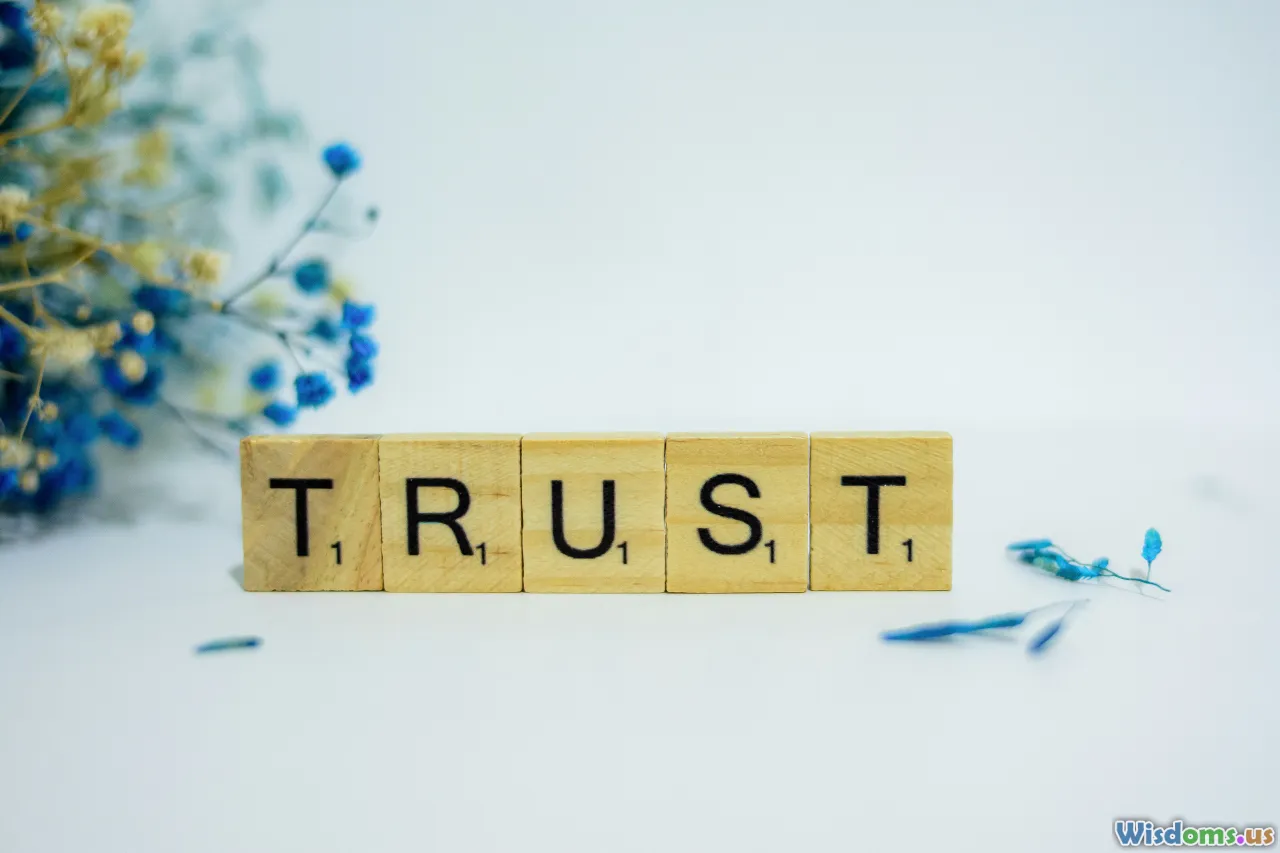
Comparing Trust Rebuilding Methods in Modern Marriages
14 min read Discover effective approaches for rebuilding trust in contemporary marriages with real-life examples and practical strategies. (0 Reviews)
Comparing Trust Rebuilding Methods in Modern Marriages
While no relationship is immune to missteps, the way couples address and mend breaches of trust has evolved dramatically. In today’s fast-moving, interconnected world, the methods to regain trust in marriage have become more nuanced and varied. Whether stemming from infidelity, financial secrets, or repeated broken promises, couples now have access to traditional strategies alongside emerging approaches tailored for modern life. But which methods are most effective for restoring a sense of safety, respect, and connection?
The Role of Transparent Communication

Modern marriage counselors often place transparent communication at the frontline of trust restoration. This involves more than simply being open; it requires cultivating an environment where both partners can openly express feelings without fear of backlash. In practice, this could mean setting aside dedicated time each week for check-ins, utilizing nonviolent communication techniques, or even harnessing digital journaling tools.
Example: One couple recovering from infidelity set a rule to share their emotional state every night before bed. Using prompts from counseling apps, they found the structure helped voice deeper insecurities before resentment festered. According to a 2021 survey by the Gottman Institute, couples who develop structured frameworks for communication are 63% more likely to successfully rebuild trust after a breach.
Concrete Steps:
- Establish regular, distraction-free sessions to talk.
- Use "I feel" statements to minimize blame.
- Validate one another’s emotions, even if uncomfortable.
In a world where digital devices can easily interfere, setting clear boundaries around meaningful conversations reinstates the importance of real connection.
Professional Counseling: Traditional and Digital Approaches

Seeking professional guidance has long been a cornerstone of trust recovery. Today, couples can opt for face-to-face therapy or explore cutting-edge teletherapy options. The flexibility of video therapy is especially valued by dual-income families or those in long-distance relationships.
Innovative Example: Therapists now employ live chat and AI-powered coaching apps to supplement traditional sessions. A 2022 study in the Journal of Marital and Family Therapy highlighted improved outcomes in trust rebuilding when digital tools accompanied in-person counseling.
Key Differences:
- In-person Therapy: Offers richer non-verbal engagement and rapid rapport; often effective for couples needing strong accountability.
- Teletherapy/Digital Counseling: Provides anonymity and schedule flexibility, allowing more frequent, bite-sized interventions.
Successful couples leverage tech to bridge logistical gaps—but regardless of the modality, effectiveness hinges on both partners’ commitment to candid participation.
The Power of Accountability and Tangible Commitments

A growing trend is the use of written commitments or “relationship contracts,” outlining actionable promises and consequences. These agreements might range from pledges of daily honesty to more specific requirements such as disclosing all financial information. Putting intentions in writing underscores seriousness and provides a method for tracking progress.
Real-World Insight: Consider Mark and Alicia, who introduced a shared online calendar for financial transparency post-breach. Psychologists argue that externalizing agreements—on paper, whiteboards, or apps—turns abstract intentions into concrete practices.
Effective Practices:
- Pair agreements with regular reviews (“trust check-ins”).
- Define clear metrics (e.g., “I will text you when arriving at the office,” rather than “I’ll be more communicative”).
- Allow mutual negotiation so contracts feel fair, not punitive.
While initially uncomfortable, systematizing trust restoration can scaffold a positive feedback loop of consistency and reliability over time.
Self-Reflection and Individual Healing Processes

Not all trust repair happens in joint conversations. Often, it’s the personal healing—of both the injured party and the responsible one—that forms a bedrock for relationship recovery. Individual therapy, mindfulness, and self-directed learning have surged in popularity as foundational tools for change.
For instance, a partner who has repeatedly betrayed trust may benefit from exploring the underlying emotional triggers with a counselor, while their spouse works on self-worth and boundary-setting independently. According to a 2023 report in Psychology Today, individual therapy accelerates marital healing by up to 40% when conducted in conjunction with couples counseling.
Practical Tips:
- Use guided journals or self-help books tailored to trust issues.
- Practice mindfulness to increase day-to-day emotional regulation.
- Allocate space for each partner to grow independently—sometimes trust rebuilds from afar, as personal confidence flourishes.
Case Insight: Michelle, after financial deception by her partner, took a three-month solo retreat, returning with greater self-awareness and clarity. Her transformation became the pivot point for honest dialog upon reunion.
Technology as Both Barrier and Bridge

Digital tools are double-edged: they can both threaten and support trust recovery. Social media often seeds suspicion or prolongs conflict, especially after breaches involving emotional affairs or secretive messaging. Conversely, shared digital calendars, location-sharing apps, and even transparency about device usage can foster a renewed sense of security.
Trending Example: Some couples install joint budgeting apps or use platforms like LastPass to share password access—decreasing secrecy. Nevertheless, reliance on technology as proof ("see my texts, see my location") should be temporary, aiming to soon make trust intrinsic again, not reliant on surveillance.
Tips for Healthy Tech Use:
- Agree collaboratively on what technologies to use and for how long.
- Set a defined endpoint for digital monitoring, after which trust operates on mutual good faith.
- Guard against compulsive checking behaviors, which can undermine trust-despite-intention.
Managed wisely, the right apps cultivate structure, while moderation ensures respect for each other’s independence and privacy.
The Importance of Empathy and Perspective Taking

Empathy—the ability to fully see and feel from your partner’s point of view—remains a timeless, powerful engine for trust recovery. This foundational principle runs through every effective method: whether conveyed during vulnerable dialogue or embodied during accountability processes.
In-Depth Example: Sarah and Kim, after a crisis over hidden debts, worked with their therapist to role-play each other’s experience. “Walking in Kim’s shoes made all the difference,” Sarah reported. Research in the Journal of Couple & Relationship Therapy reveals empathy training can reduce recurrence of hurtful behavior by almost 50%.
Practical Guidance:
- Use mirroring: Repeat back what your partner has said to confirm understanding.
- Write letters to each other detailing thoughts and feelings—unsent at first, which encourages honesty without fear of judgment.
- Commit to non-defensive listening exercises during heated moments.
Prioritizing emotional presence over quick fixes solidifies mutual trustworthiness, breaking cycles of misunderstanding.
Community and Social Support Networks

Recognizing that couples are not islands, many modern pairs restore trust by involving others in healing. This can happen through faith-based advisors, support groups, or simply leaning on close friends and family for encouragement and accountability. For couples uncomfortable seeking formal counseling, peer groups offer a confidential, normalized environment for processing betrayal.
Post-crisis, attending a support group—whether in person or virtually—has demonstrated remarkable potential for strengthening resolve. The American Association for Marriage and Family Therapy notes that couples who maintain social ties report lower relapse rates of trust violations.
Community Approaches:
- Join a marriage enrichment class or online forum, like Reddit’s r/relationship_advice, for crowd-sourced input.
- Encourage supportive friendships that reinforce honesty and growth.
- Consider whole-family discussions if the breach has affected children or relatives.
The simple knowledge that others have survived—and even thrived—after betrayals injects hope and practical wisdom into the process.
Cultural Sensitivity and Personalized Solutions

No two couples or betrayals are alike. Cultural expectations often dictate norms around privacy, punishment, and what constitutes forgiveness. What works in a Western context—such as explicit verbal apologies—may appear inadequate or insincere within more collectivist traditions, where actions and reparations are valued over words.
Comparative Insight:
- In some cultures, restoring trust involves community mediation, family ceremonies, or formal statements before elders.
- For LGBTQ+ partners, who may already face social isolation, unique challenges arise in disclosing breaches of trust and seeking support. Specialized groups or affirming counselors can be life-changing.
Customizing methods to personalities, histories, and identities acknowledges the complexity of each union. Instead of one-size-fits-all “fixes,” modern marriages benefit from merging cultural wisdom with individually-tailored interventions.
Rebuilding Intimacy: Physical and Emotional Ties

Marital setbacks don’t only erode emotional closeness—they often undermine physical intimacy and affectionate connection. Consistent, small gestures (like hand-holding or re-establishing date nights) foster positive psychological association, gradually closing the distancing gap.
Example in Practice: After a trust breach, Sharon and Luis reinstated rituals from the early days of their relationship—Saturday morning walks and monthly movie nights—rather than forcing deep conversation. Over time, the routines rebuilt their comfort and tenderness.
Tips to Renew Intimacy:
- Take intimacy slowly; touch with permission and patience.
- Reminisce over shared happy experiences to reignite companionship.
- Consult resources on rebuilding sexual trust, if relevant, ensuring mutual comfort every step of the way.
Physical closeness grows most authentically when paired with emotional vulnerability and respect for new boundaries.
Preventing Future Breaches: Sustaining a Trustworthy Marriage

Perhaps the truest measure of a marriage’s recovery is the continued maintenance of trust. Couples benefit from proactive strategies, creating systems that catch small missteps before they snowball. Periodic “trust check-ups,” ongoing access to counseling (not just in times of crisis), and growing a repertoire of shared coping skills all compound to future-proof the marriage.
Forward-Thinking Approaches:
- Plan recurring relationship reviews—every 6 or 12 months, with or without professional help.
- Identify early-warning signs of retreating trust (withdrawal, secrecy, stonewalling) and address them quickly.
- Celebrate successes, however modest, to reinforce renewed faith in each other.
Over the long haul, prevention is just as critical as intervention—ensuring old wounds remain closed and trust becomes resilient against future pressures.
Navigating the road back to trust is seldom linear or easy, but modern couples enjoy a greater depth and breadth of transformational resources than ever before. The most valuable method remains the one that both partners fully invest in—transforming conflict into an opportunity for intimate, enduring growth.
Rate the Post
User Reviews
Other posts in Rebuilding Trust After Betrayal
Popular Posts

















